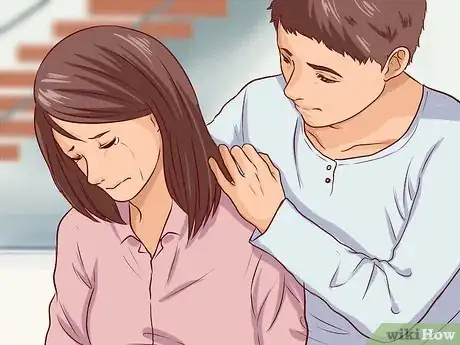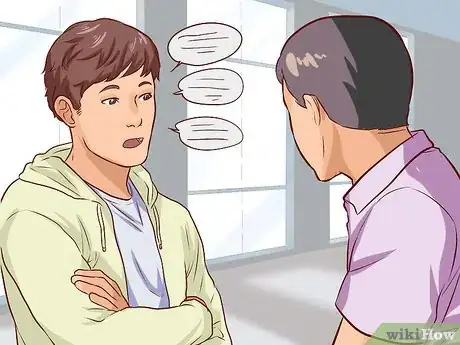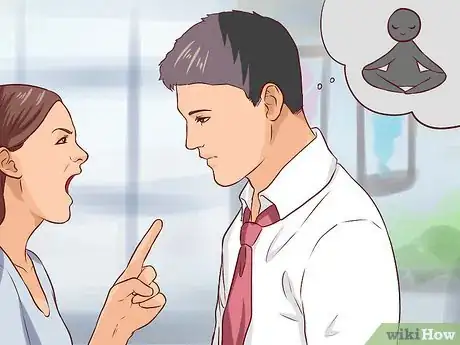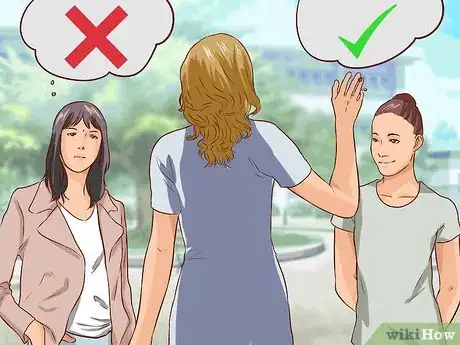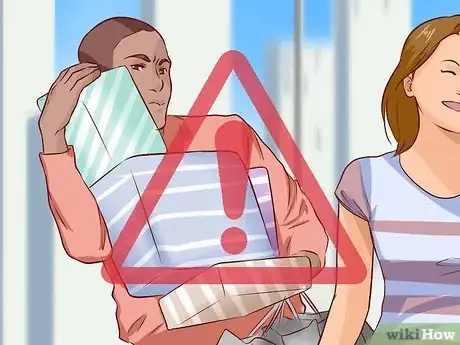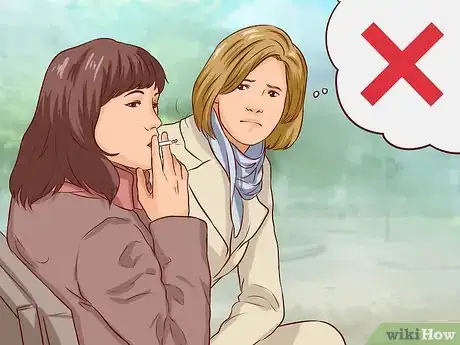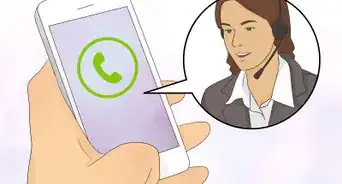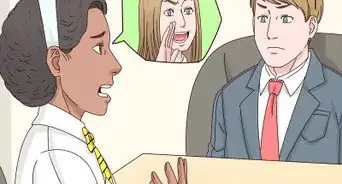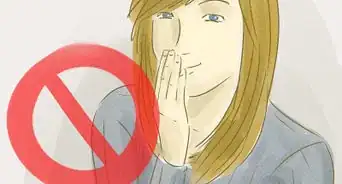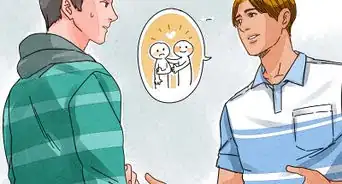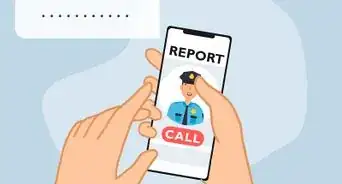This article was co-authored by Trudi Griffin, LPC, MS. Trudi Griffin is a Licensed Professional Counselor in Wisconsin specializing in Addictions and Mental Health. She provides therapy to people who struggle with addictions, mental health, and trauma in community health settings and private practice. She received her MS in Clinical Mental Health Counseling from Marquette University in 2011.
There are 13 references cited in this article, which can be found at the bottom of the page.
This article has been viewed 71,970 times.
Have you ever wished people would show you a little more kindness? While you can't control the way others act, you can certainly avoid giving them reasons to be anything but nice to you. In this article, we'll show you how to make a good impression and treat others in a positive way so they'll be nicer to you.
Steps
Making a Good Impression
-
1Be yourself. People more easily warm to someone who is authentic, honest, and genuine.[1]
- Part of being yourself means staying authentic, even in the face of fads and trends. It's natural to experiment and try new things at any age to discover your likes, dislikes, and what makes you feel good and comfortable.
-
2Speak humbly. People find braggers and conceited individuals to be less nice than humble folks. The more you appreciate others instead, the nicer your friend will think you are.[2]
- We often try to impress people to make them like us. Instead of playing the ‘how awesome can I make myself sound’ game, speak honestly and genuinely about yourself when asked but try to keep the focus on the other person, which will make him feel valued.[3]
- Be able to summarize what your friend is saying. This shows you are really listening and he will appreciate that.
Advertisement -
3Use his name. Remember that a person's name is to that person the sweetest and most important sound in any language and using it is the fastest way to build rapport.[4]
- Using someone’s name in conversation makes him feel important, valued, and respected, and makes a lasting positive impression.
- For a difficult name, ask the person to help you pronounce it. Don’t feel embarrassed by it – he will thank you for caring enough to ask.
-
4Live with empathy. Being kind to others and open to the world naturally draws other people towards you.
- Showing empathy and even some vulnerability may help someone bond with you on a more intimate level of humanity.[5]
- Show acceptance. Life comes in all walks, all races, all orientations, and the more accepting and, better yet, supportive and appreciative you are of other people, the nicer you will be seen.[6]
- Be polite and considerate and have good manners.
- Don’t try to fix other people. When you hear his problems, your friend will appreciate you asking questions to help him solve his own problems. Ask open-ended questions starting with “how” or “why” to get him thinking.[7]
-
5Be giving. Practice random acts of kindness. Even if no one is looking, you will feel better about yourself by being altruistic and studies show that our kindness in turns breeds kindness towards us and happiness.[8]
- There are so many ways you can practice random acts of kindness. Donate your clothes to the homeless. Sit with seniors and keep them company. Let somebody in on the freeway. Pay it forward with a coffee.[9]
Showing You’re Nice Non-Verbally
-
1Smile! Having a friendly expression is the first step in putting your friend at ease.
- Have a nice, relaxed, and genuine smile that doesn’t look forced.
-
2Lean in. Having a body posture that suggests you are truly interested in someone lets him see how nice you are being to him.
- Sit leaning slightly forward with your arms casually at your sides. Crossing your arms gives off an appearance of being guarded and closed.
-
3Really listen carefully. Be present in your conversation, ask questions to show you are interested and listening, and your friend will sense you are a person that he can really relax, trust, and talk to. People just really want to be heard.[10]
- Asking questions about the people you are with makes the other feel special.
- Look at it like a detective game, where the goal is to pick up on clues and cues as to who the other person really is inside. You’ll take more interest in him this way, and the person you are talking to will really warm to you.[11]
-
4Make eye contact. Good listeners make eye contact for about 75% of a conversation. You don’t want to stare, but show you’re interested.[12]
- Look between his eyes and the bridge of his nose, or just slightly to the side at his ear lobe.
-
5Ask how others perceive you. Although you can’t be everything to everybody, you can ask a friend how you appear in social circles and if you seem open and friendly or closed and unwelcoming. You may find that you are unintentionally giving off the wrong vibe.[13]
- You might think, for example, that your active-listening face shows you are intently paying close attention but an outsider may think you look stern or even angry.
- Always offering to help people may come from a place of generosity and friendliness but may be accidentally perceived as you thinking that your friends can’t do something well enough on their own. You might not know this, however, unless you ask.
- Guard your emotions, however, and be prepared in case you hear your friend bluntly tell you that you come off entirely different than you imagine.[14]
Nurturing Your Self-Respect
-
1Practice self-respect. People are more likely to like and respect you if you respect yourself.[15]
- Be assertive, nice, authentic, and confident.
-
2Be nice to everyone. The theory of indirect reciprocity states that even if you are nice to one person and that person isn’t necessarily nice back to you, someone else will be. That is because someone else will likely notice your kindness, form a higher opinion of you, and you will feel good about yourself.[16]
- Being nice to everyone does not make you a doormat, however. You can still say no to people – you just don’t have to be mean to people in the process.[17]
- Be assertive and kind yet firm when saying no. Be brief, stating the reason you are declining someone’s request honestly but without elaborate explanations.
-
3Stay nice even if you think you’re being wronged. If you think someone is undermining you or being unkind, remember that your perception is only part of the situation. You could be interpreting his actions incorrectly and acting negatively on an incorrect assumption will only get you more negativity.[18]
- For example, be nice to your co-worker, even if you think he’s taking credit for your idea – maybe he had a really bad day and truly forgot to put your name on the contribution list.
- Explore why that person might not be acting kindly toward you. If you have reached an impasse that you cannot mend, you can still be polite and considerate, taking the high road.[19]
-
4Know that you are not responsible for making other people like you. Ultimately, you can only do so much to influence how other people perceive you and you have to accept that some people just might not warm to you for one reason or another.
- Many first impressions are based on competence and warmth.[20]
-
5Don’t try to do everything for everyone. Learn the difference from being kind to people and having to do things for them. You don’t have to please everyone all the time.[21]
- Spend your quality time with others wisely versus just trying to gain their approval by doing things for them. You will respect yourself more and they will, too.
-
6Recognize and part with toxic friends. Sometimes, no matter how hard you try to be nice and want to be somebody’s friend, he’s just not the best person for you and won’t change his behaviour. Stay with supportive friends who make you feel good about yourself and let the bullies and toxic friends go.[22]
- Consider whether this person puts you down, makes jokes at your expense, and whether you feel happy or sad in this person’s presence. If you feel unhappy when you are with him, he might not be a good choice of friend.
- Detach from this person, don’t initiate contact, and put your effort into your healthy friendships instead.
- Be friendly, polite, and kind when you can’t avoid seeing this person and don’t talk bad about him to other people.
References
- ↑ https://www.psychologytoday.com/articles/200804/dare-be-yourself
- ↑ http://www.entrepreneur.com/article/248926
- ↑ http://www.businessinsider.com/6-things-you-can-do-to-make-people-love-you-2015-8
- ↑ http://www.washingtonpost.com/business/capitalbusiness/career-coach-the-power-of-using-a-name/2014/01/10/8ca03da0-787e-11e3-8963-b4b654bcc9b2_story.html
- ↑ http://www.theguardian.com/lifeandstyle/2015/apr/17/influencing-how-others-see-you-oliver-burkeman
- ↑ http://www.entrepreneur.com/article/248926
- ↑ http://www.businessinsider.com/6-things-you-can-do-to-make-people-love-you-2015-8
- ↑ http://greatergood.berkeley.edu/article/item/kindness_makes_you_happy_and_happiness_makes_you_kind
- ↑ https://www.randomactsofkindness.org/kindness-ideas
- ↑ http://www.entrepreneur.com/article/248926
- ↑ http://www.businessinsider.com/6-things-you-can-do-to-make-people-love-you-2015-8
- ↑ http://www.businessinsider.com/6-things-you-can-do-to-make-people-love-you-2015-8
- ↑ https://www.theatlantic.com/health/archive/2015/04/mixed-signals-why-people-misunderstand-each-other/391053/
- ↑ https://www.psychologytoday.com/articles/200505/metaperceptions-how-do-you-see-yourself
- ↑ https://www.psychologytoday.com/blog/communication-success/201309/are-you-too-nice-7-ways-gain-appreciation-respect
- ↑ https://www.theatlantic.com/business/archive/2015/06/it-pays-to-be-nice/396512/
- ↑ https://www.psychologytoday.com/blog/communication-success/201309/are-you-too-nice-7-ways-gain-appreciation-respect
- ↑ https://www.theatlantic.com/business/archive/2015/06/it-pays-to-be-nice/396512/
- ↑ https://www.psychologytoday.com/blog/communication-success/201309/are-you-too-nice-7-ways-gain-appreciation-respect
- ↑ http://citeseerx.ist.psu.edu/viewdoc/download?doi=10.1.1.379.7329&rep=rep1&type=pdf
- ↑ https://www.psychologytoday.com/blog/communication-success/201309/are-you-too-nice-7-ways-gain-appreciation-respect
- ↑ https://www.psychologytoday.com/blog/magnetic-partners/201301/toxic-friendships



